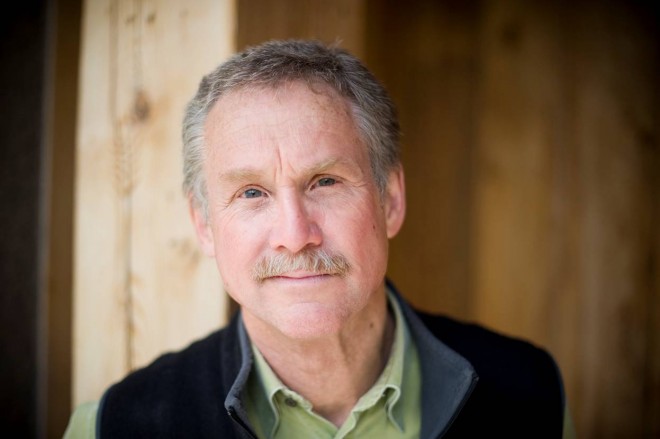
What I’m working on:
I’m catching up on my duties to National Geographic, after having spent most of last year on my book Spillover. As a Contributing Writer, I do three features for Nat Geo per year. Latest assignment is a story derived from an expedition to Franz Josef Land, a remote archipelago in the Russian Arctic. I was up there on a boat for six weeks with a team of very interesting scientists. This autumn I’m also working on a proposal for my next book, and have one assignment pending for Harper’s, to be researched as soon as I can get to New Zealand.
Where I work:
Field research: I work in remote places all over the world—quite often tropical forests, swamps, mountains, savannas, deserts. From the Congo to the Serengeti to, as I just mentioned, the Russian Arctic. Home: My workspace for writing is a very nice office at the back of my home in Bozeman, Montana.
Daily routine:
If I’m home and in the writing phase of a project: Up around 7:00 a.m., coffee, handful of fruit, a bit of work-related reading to let my brain get going; then I spend a couple hours revising the first-draft pages from yesterday. Then a break, late morning, to eat breakfast (at my desk), after which I walk the dogs. Back to work, I push forward with new first-draft pages. Another break in mid-afternoon, a handful of peanuts or a banana as a walking lunch, an errand to the post office, then back to work, a little more writing. On a good day, I finish all this by 4:00 p.m. (in summer) and go for a hard road-bike workout. In winter, maybe finished by 5:30 p.m., and I take a run, in the snow, or else walk to the local city rink for a little ice-skating. Shower, cocktail hour, dinner. If I’m in the home stretch on a book project, I might write again in the evening.
Most productive part of my day:
The most productive period for new work is that stretch of hours after the late breakfast, when I forge forward into first-draft pages. But probably 70 percent of my writing time, at least, is spent re-writing, and that’s of course absolutely necessary too.
Most essential ritual or habit:
Coffee, dogs, exercise: These are the enzymes and interstitial activities conducive to problem-solving, new ideas, and logjam breaking. As I’ve gotten older, and under the influence of my wife Betsy, I’ve been spending more and more time walking dogs. Harry, Stella, Nick.
Mobile device:
I’m now an Apple nerd: iPhone, iPad, iPod. Oh, and a Kindle. The iPad and Kindle are for when I travel. Rollerblades too count as mobile devices, yes?
Computer:
MacBook. Doesn’t have to be a Pro, I’m just a writer.

Essential software/apps/productivity tools:
Reporter’s notebooks; ballpoint pens; small ledger journal as travel diary; MS Word; Olympus LS11 digital recorder; aluminum file cabinets.
Favorite time waster/procrastination habit:
Um. Occasionally late at night, if I’m too tired to read, I watch episodes of “Justified” or “Mad Men” on my laptop or iPad. I suppose Twitter falls into this category too. But I don’t seek means of procrastination; I enjoy the terrible strenuousness of writing too much to hide from it.
My reading habits:
Like most of us, I’m usually reading several books at a time. Work-related book for the coffee half-hour in early morning; literary nonfiction (history, biography, history of science) or (rarely) fiction in the evening. Also I read a lot of scientific journal papers. Also I try to keep up with a few magazines—Nat Geo, Harper’s, the New Yorker, others—and wish I were able to keep up with more. If I’m walking across a jungle or doing something else remote from civilization, I might take a Trollope novel for total escape in the tent at night.
By the way, I read like a snail. Very slowly. I re-read virtually every sentence, taking that second glance at structure and style. I mean even, god help me, when reading the newspaper. Sometimes I wish I could plow through books quickly, but mostly I feel that slow reading has been inherent and crucial to my appreciation of (and skill at, if any) literary construction and rhythms. It drives me crazy when someone says to me: “Oh, just read this book, it’s short, it’s a quick read.” For me it is not a quick read, and I am jealous of my reading time, which is among the most precious resources I have. When someone makes that “It’s a quick read” comment to me, I know immediately they have no idea who I am or how I work. So their recommended book goes to the bottom of the pile.
Sleep schedule:
7–8 hours per night if I can get it. When I travel, I sleep on planes, busses, lying on a glacier, sitting against a tree—whenever and however necessary.


